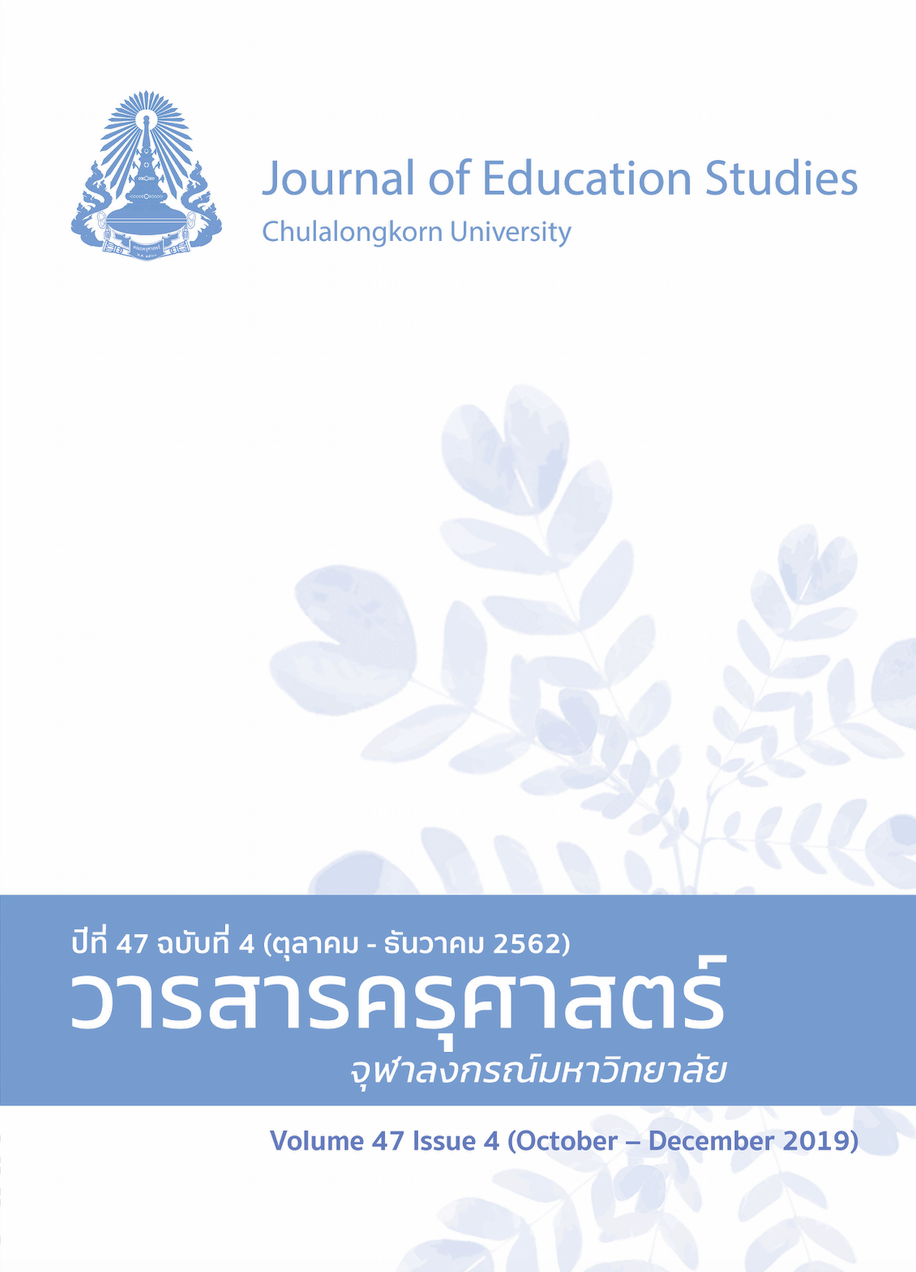Evaluation of an Early Childhood Teacher Education Curriculum in Lao People's Democratic Republic (Lao PDR)
Keywords:
CURRICULUM EVALUATION, EARLY CHILDHOOD TEACHER EDUCATION CURRICULUM, BACHELOR’S DEGREE PROGRAMME, LAO PDR, DONGKHAMXANG TEACHER TRAINING COLLEGESAbstract
This study aimed to 1) evaluate the early childhood teacher education curriculum, Bachelor’s Degree programme in Dongkhamxang teacher training college in Lao PDR, and 2) identify areas for improvement of the early childhood teacher education curriculum, Bachelor’s Degree programme in Dongkhamxang teacher training college in Lao PDR. The evaluation methodology was a CIPP model consisting of 5 components: content, input, process, product and impact by Stufflebeam. The total number of population and samples from purposive sampling was 333. The population consisted of college administrators, lecturers, graduates, and 2nd year to 4th year current students. Samples from purposive sampling consisted of school supervisors, employers and early childhood experts. The instruments were a curriculum evaluation questionnaire, curriculum evaluation interview, curriculum evaluation form and a questioning approach for a focus group technique which were verified and revised by experts’ recommendations. Data analysis used percentages, arithmetic mean, standard deviation and content analysis. The research results were (1) Context: Curriculum structures, courses and contents were appropriate to reach curriculum objectives and context. Strengths were lecturers and the awareness of the program. The weakness was the physical environment; (2) Input: The input covered qualifications of students and lecturers. Instructional media and learning/teaching materials needed improvement. Program budgeting was rated as fair; (3) Process: The process reached the requirements of curriculum management and student teaching practicum; (4) Product: Knowledge and teaching practicum were well designed and reached the requirement for professional practice and professional conduct; (5) Impact: It met the satisfaction of graduates and employers.
The overall evaluation was highly appropriate. Curriculum improvements should include depleting duplicate content, adding courses for student teaching preparation, the student selection process, appropriate classroom settings, and adequate computer services.
References
Cole, M. (2012). Education, equality and human rights: Issues of gender, ‘race’, sexuality, disability and social class. New York, NY: Routledge.
EFA 2015 Review Group and Secretariat Group, Lao PDR. (2014). National EFA 2015 review report: Country report of Lao PDR. Retrieved from http://unesdoc.unesco.org/images/
0023/002314/231489e.pdf
Greenwald, R., Hedges, L. V., & Laine, R.D. (1996). The effect of school resources on student achievement. American Educational Research Association, 66(3), 361-396.
Kajiyama, Y. (2016). [Laos] The system, policies, current situation and issues of ECCE in Laos. Retrieved from https://www.childresearch.net/projects/ecec/2016_03.html
Kanjanavasee, S., Rattana-ubon, A., Patumcharoenwatana, W., Yoorayong, C., Tansakul J., & Kingkhoontod, T. (2012). An evaluation of 5 years teacher education, faculty of education, Chulalongkorn university (Research Report). Bangkok: Faculty of Education, Chulalongkorn University.
Kijratporn, P. (2011). Framework of teacher education, production and development in basic education level. Bangkok: Retrieved from http://etcserv.pnru.ac.th/datas/file/jilefsvmbo.pdf
Ministry of Education and Sports of Lao PDR. (2012). National early childhood education curriculum. Lao PDR: Research Institute of Educational Science.
Ministry of Education and Sports of Lao PDR. (2011). Review of pre-service teacher education system in Lao PDR: Final report (Research Report). Bangkok: UNESCO Office Bangkok.
Oliver, R. M., Wehby, J. H., & Reschly, D. J. (2011). Teacher classroom management practices: Effects on disruptive or aggressive student behavior. Evanston, IL: Society for Research on Educational Effectiveness.
Phommachack, V., & Phommasy, V. (2016, October). Country report: Lao people democratic republic. Paper presented at the Regional Consultative Meeting on the Establishment of SEAMEO (CECCEP) Paragon Suites and Resort, Bali-Indonesia.
Rose, L. C., & Gallup, A. M. (2005). The 37th annual Phi Delta Kappa/Gallup poll of the public’s attitudes toward the public schools. Phi Delta Kappan, 87(1), 41-57.
Rueangpanit, P. (2010). An evaluation of a bachelor of education degree program in pre–school education under the corporation of educational personnel development of local administration organization between department of local administration and Suan Dusit Rajabhat university: The case study of nakhonsawan academic center (Unpublished Master’s Thesis). Srinakharinwirot University, Bangkok.
Stufflebeam, D. L. (2002). The CIPP model for evaluation. In D. L. Stufflebeam, G. E. Madaus, & T. Kellaghan (Eds.), Evaluation models: Viewpoints on educational and human services evaluation (pp. 279-318). New York: Kluwer Academic Publishers.
The Southeast Asian Ministers of Education Organization [SEAMEO], & The United Nations Educational, Scientific and Cultural Organization [UNESCO]. (2016). Southeast Asian guidelines for early childhood teacher development and management. Bangkok: SEAMEO Secretariat and UNESCO Office Bangkok.
The United Nations Educational, Scientific and Cultural Organization [UNESCO]. (2012). Lao PDR: UNESCO country programming document, 2012-2015. Bangkok: UNESCO Office Bangkok.
The United Nations Educational, Scientific and Cultural Organization [UNESCO], & The Southeast Asian Ministers of Education Organization [SEAMEO]. (2018). Early childhood care and education (ECCE) teacher competency framework for Southeast Asia (SEA). France: UNESCO.
Thumthong, B. (2010). Curriculum development. Bangkok: Chulalongkorn University Press.
Tyler, R. W. (1986). Program evaluation. International Journal of Education Research, 10, 53-67.
Ulvik, M., & Smith, K. (2011). What characterises a good practicum in teacher education?. Education Inquiry, 2(3), 517-536
Vargas-Barón, E. (2015). Policies on early childhood care and education: their evolution and some impacts. Paris: UNESCO.
Wongyai, V. (1994). Process of curriculum development and practice. Bangkok: Suweeriya Printing.




